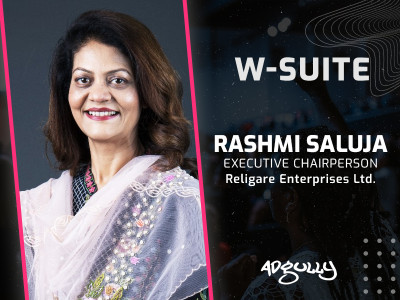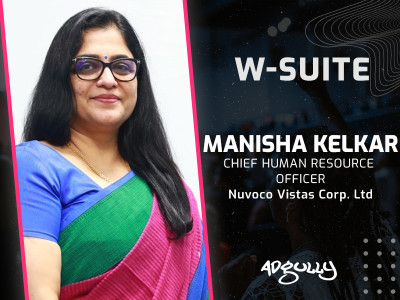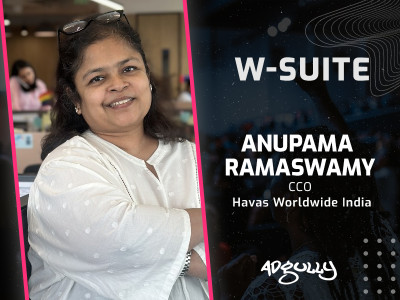The W Suite | “Leadership development in women is more needed than everâ€
Diversity in the workforce has become a necessity today, and more so in leadership positions. It can’t be denied that women bring a high level of creativity and empathy while solving problems and handling crises. Women leaders bring to the table a different level of dexterity.
Adgully’s ‘The W-Suite’ series features interactions with influential women leaders in India, who share some deep insights on what being a woman leader means in India’s business landscape, the mantras to succeed, achieving work-life balance, pay parity and much more.
Madhura Ranade is Head - Branded Content & Partnerships at Isobar India. She heads the department for Isobar India working on branded content strategy for clients across all Isobar locations in India. Ranade has been recognised as the Campaign Asia Young Achiever 2017, and Media Ace Client Lead of the Year 2017 for her work on Maruti Suzuki. She has also been featured in the Impact Magazine Top 30 under 30 list in the 2018 issue. A marketing postgraduate from the University of Birmingham, UK, Ranade has been working in the digital industry since 2011.
How would you define today’s woman leader?
Firstly, there is a clear difference between being just a boss and being a leader, irrespective of gender. A boss – whether due to a subconsciously hammered perception in media, or the word itself – seems like a person who would order or ‘boss’ people around, manage or micro-manage and supervise. Whereas a leader guides, nurtures and inspires. A good leader leads by example. I think it is important to establish that at the outset. But today’s woman leader is someone who is in control, is inclusive, isn’t scared to put her point forth. She is more prone to change with the capacity to operate in different directions.
What are the foremost attributes that women leaders in today’s business ecosystem must possess?
Confidence. Fearlessness. Resilience. These are the key attributes for not just any woman leader, but all women, irrespective of what position they are at.
Despite the qualifications, aptitude, and experience, why do you think we don't see the expected number of women business leaders, especially when it comes to boardroom decision-making?
There are, of course, many factors that contribute to this dearth of women at senior levels. For centuries, there have been broad, cultural biases against women and unfortunately, stereotypes die slowly. People have always believed that many women choose not to aspire to the highest ranks of the organisation and take themselves out of the running, although most recent studies dispute that. One can come across a lot of research that shows that as much as we’d like to deny it, unconscious bias in hiring and promotion decisions, contributes to the lower number of women in key positions.
What more do Indian corporates need to do to encourage and groom women leaders?
Leadership development in women is more needed than ever. A lot of organisations only speak about diversity and inclusion, but they now need to realise that the kind of talent that helped them get to where they will not help them survive in the ruthless and volatile environment we operate in today. We need leaders and thinkers with an approach that is empathetic, inclusive and dynamic. Women are known to have higher emotional intelligence and can drive change positively.
But to see this kind of thinking at a hiring stage, most men (in the leadership positions) need to start getting more involved. If men start influencing and driving these conversations and make a case for women leaders, we will see this change happening much sooner.
According to you, what are the Do’s and Don’ts for today’s women to break through the glass ceiling?
Do’s:
- Take the power to lead.
- Ask for what you deserve.
- Do what it takes to get to the top. The hard work you put in doesn’t change just because you are a woman.
Don’ts:
- Don’t expect to be cut any slack because you are a woman.
- Don’t undervalue your talent. You are better than you give yourself credit for.
- Don’t shy away from conflict or confrontation.
How acute is the gender pay gap issue in India today? What needs to be done to address this in an effective manner?
Pay parity is a serious issue, yes. However, when we speak of this, we need to remember that it is not just based solely on a job title, and I don’t necessarily agree that any two people holding the same job title should automatically be paid the same salary. Performance standards, quality of work, the value that people add are some huge factors that must also be considered. There are instances where a man should and does make less than a woman and vice versa. However, with all things being equal, the compensation and promotion opportunities should be too and doing otherwise is just wrong.
What needs to be done is two people need to be treated as equals. What should be compared is the kind of work they do and the value they bring to the table as individuals and employees, not their gender.
Do you think the leadership effectiveness of women is higher than men? Why?
Absolutely! There are so many areas in which women do so well and these are mostly inherent qualities in women. Being self-starters or taking initiative, working towards self-development and being more helpful to others, building positive working relationships at work, and valuing communication. However, as women, just having these qualities is not enough – we need to work much harder to prove ourselves and get noticed, enough to be considered for a leadership position. We feel constant pressure to never make any mistakes and also to prove that we are valuable assets to an organisation.
What are the five most effective lessons that you have learned as a woman leader?
- The higher up you climb, the lower people will try to bring you down.
- People will talk. They will assume that you are where you are not just because of your work.
- As you grow, and especially if you are a woman, you will find lesser cheerleaders. You need to speak for yourself. Find your conflict style and apply it as necessary and appropriate. It doesn’t always mean you should fight or have the last word, but you will be respected if you articulate your point of view.
- Don’t let fear or under-confidence keep you from the spotlight. Find opportunities that will help you stand out or demonstrate your value.
- Step away from the constant need to please. Stop worrying about being called names. As long as you are respectful, you can be tactful, direct or assertive in your own way. You are here to make results, not friends.
How challenging has it been for you to maintain a balance between career goals and family responsibilities? What is your mantra to maintain that balance?
Well, let’s just say it is not easy. There have been times where it bogs you down, but then you have to push yourself hard to make it count at work. While I love my work, family always comes first. The mantra is to never forget that! I prioritise and manage my time. And honestly, you need to take time out to make time for what is important to you – you will never find free time.
How prevalent are the instances of sexual harassment in workplaces in India? What should the industry collectively do to tackle such a serious issue?
The only thing the industry should do is have zero tolerance for sexual harassment. After the #MeToo movement, people have become more aware because a lot of organisations took this seriously and conducted workshops and training to explain to employees what constitutes sexual harassment. But it is certainly not over. Incidents of sexual harassment at work are still very much prevalent, and we need to remember that no case is big or small and action must be taken against what is wrong.


















Share
Facebook
YouTube
Tweet
Twitter
LinkedIn